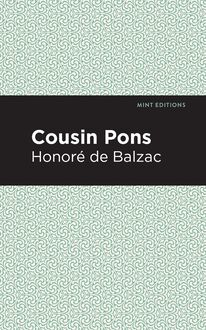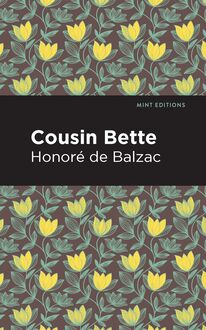-
 Univers
Univers
-
 Ebooks
Ebooks
-
 Livres audio
Livres audio
-
 Presse
Presse
-
 Podcasts
Podcasts
-
 BD
BD
-
 Documents
Documents
-
- Cours
- Révisions
- Ressources pédagogiques
- Sciences de l’éducation
- Manuels scolaires
- Langues
- Travaux de classe
- Annales de BEP
- Etudes supérieures
- Maternelle et primaire
- Fiches de lecture
- Orientation scolaire
- Méthodologie
- Corrigés de devoir
- Annales d’examens et concours
- Annales du bac
- Annales du brevet
- Rapports de stage
La lecture à portée de main
Vous pourrez modifier la taille du texte de cet ouvrage
Découvre YouScribe en t'inscrivant gratuitement
Je m'inscrisDécouvre YouScribe en t'inscrivant gratuitement
Je m'inscrisEn savoir plus
Vous pourrez modifier la taille du texte de cet ouvrage
En savoir plus

Description
Cousin Bette (1846) is a novel by French author Honoré de Balzac. Part of Balzac’s La Comédie humaine sequence, the novel is recognized as being the author’s last fully-realized work, and features several characters who appear elsewhere throughout his legendary series. It has inspired several film and television adaptations, as well as earned comparisons to Shakespeare’s Othello and Tolstoy’s War and Peace.
The novel focuses on the life and exploits of Bette Fischer, a 42-year-old woman whose bitterness at remaining unmarried—despite several proposals by men she deemed unworthy—drives her to ruin the reputations and lives of her extended family. After rescuing the young sculptor Wenceslas Steinbock from suicide, Bette develops a complex affection for the man. When he falls in love with Hortense, the daughter of Bette’s cousin Adeline, she hatches a plan to gain revenge for this perceived personal slight. She recruits the young and beautiful Valérie Marneffe—an unhappily married woman—to seduce Adeline’s husband, Baron Hector Hulot, whose uncontrolled desires and extensive vanity both test his family’s loyalty and stretch their finances to the furthest possible limit. Cousin Bette is an intense psychological drama and character study that burns with the fire of Balzac’s critique of French society. While exposing the depths of human immorality—particularly where money is made the center of personal relationships—Balzac manages to remind us that what makes us human is not what drives us apart, but the lengths to which we will go to cultivate love despite our basest impulses.
To read Cousin Bette is to observe the hopes, flaws, and desires of the people of nineteenth century France, but to ultimately judge ourselves. This final masterpiece of Honoré de Balzac is a testament to the skill and dedication of one of history’s finest literary minds.
With a beautifully designed cover and professionally typeset manuscript, this edition of Honoré de Balzac’s Cousin Bette is a classic of French literature reimagined for modern readers.
Sujets
Informations
| Publié par | Mint Editions |
| Date de parution | 01 décembre 2020 |
| Nombre de lectures | 0 |
| EAN13 | 9781513273259 |
| Langue | English |
| Poids de l'ouvrage | 2 Mo |
Informations légales : prix de location à la page 0,0500€. Cette information est donnée uniquement à titre indicatif conformément à la législation en vigueur.
Extrait
Cousin Bette
Honor é de Balzac
Cousin Bette was first published in 1846.
This edition published by Mint Editions 2021.
ISBN 9781513268255 | E-ISBN 9781513273259
Published by Mint Editions®
minteditionbooks.com
Publishing Director: Jennifer Newens
Design & Production: Rachel Lopez Metzger
Translation: James Waring
Typesetting: Westchester Publishing Services
C ONTENTS B EGIN R EADING
One day, about the middle of July 1838, one of the carriages, then lately introduced to Paris cabstands, and known as Milords , was driving down the Rue de l’Universite, conveying a stout man of middle height in the uniform of a captain of the National Guard.
Among the Paris crowd, who are supposed to be so clever, there are some men who fancy themselves infinitely more attractive in uniform than in their ordinary clothes, and who attribute to women so depraved a taste that they believe they will be favorably impressed by the aspect of a busby and of military accoutrements.
The countenance of this Captain of the Second Company beamed with a self-satisfaction that added splendor to his ruddy and somewhat chubby face. The halo of glory that a fortune made in business gives to a retired tradesman sat on his brow, and stamped him as one of the elect of Paris—at least a retired deputy-mayor of his quarter of the town. And you may be sure that the ribbon of the Legion of Honor was not missing from his breast, gallantly padded a la Prussienne . Proudly seated in one corner of the milord , this splendid person let his gaze wander over the passers-by, who, in Paris, often thus meet an ingratiating smile meant for sweet eyes that are absent.
The vehicle stopped in the part of the street between the Rue de Bellechasse and the Rue de Bourgogne, at the door of a large, newly-build house, standing on part of the court-yard of an ancient mansion that had a garden. The old house remained in its original state, beyond the courtyard curtailed by half its extent.
Only from the way in which the officer accepted the assistance of the coachman to help him out, it was plain that he was past fifty. There are certain movements so undisguisedly heavy that they are as tell-tale as a register of birth. The captain put on his lemon-colored right-hand glove, and, without any question to the gatekeeper, went up the outer steps to the ground of the new house with a look that proclaimed, “She is mine!”
The concierges of Paris have sharp eyes; they do not stop visitors who wear an order, have a blue uniform, and walk ponderously; in short, they know a rich man when they see him.
This ground floor was entirely occupied by Monsieur le Baron Hulot d’Ervy, Commissary General under the Republic, retired army contractor, and at the present time at the head of one of the most important departments of the War Office, Councillor of State, officer of the Legion of Honor, and so forth.
This Baron Hulot had taken the name of d’Ervy—the place of his birth—to distinguish him from his brother, the famous General Hulot, Colonel of the Grenadiers of the Imperial Guard, created by the Emperor Comte de Forzheim after the campaign of 1809. The Count, the elder brother, being responsible for his junior, had, with paternal care, placed him in the commissariat, where, thanks to the services of the two brothers, the Baron deserved and won Napoleon’s good graces. After 1807, Baron Hulot was Commissary General for the army in Spain.
Having rung the bell, the citizen-captain made strenuous efforts to pull his coat into place, for it had rucked up as much at the back as in front, pushed out of shape by the working of a piriform stomach. Being admitted as soon as the servant in livery saw him, the important and imposing personage followed the man, who opened the door of the drawing-room, announcing:
“Monsieur Crevel.”
On hearing the name, singularly appropriate to the figure of the man who bore it, a tall, fair woman, evidently young-looking for her age, rose as if she had received an electric shock.
“Hortense, my darling, go into the garden with your Cousin Betty,” she said hastily to her daughter, who was working at some embroidery at her mother’s side.
After curtseying prettily to the captain, Mademoiselle Hortense went out by a glass door, taking with her a withered-looking spinster, who looked older than the Baroness, though she was five years younger.
“They are settling your marriage,” said Cousin Betty in the girl’s ear, without seeming at all offended at the way in which the Baroness had dismissed them, counting her almost as zero.
The cousin’s dress might, at need, have explained this free-and-easy demeanor. The old maid wore a merino gown of a dark plum color, of which the cut and trimming dated from the year of the Restoration; a little worked collar, worth perhaps three francs; and a common straw hat with blue satin ribbons edged with straw plait, such as the old-clothes buyers wear at market. On looking down at her kid shoes, made, it was evident, by the veriest cobbler, a stranger would have hesitated to recognize Cousin Betty as a member of the family, for she looked exactly like a journeywoman sempstress. But she did not leave the room without bestowing a little friendly nod on Monsieur Crevel, to which that gentleman responded by a look of mutual understanding.
“You are coming to us to-morrow, I hope, Mademoiselle Fischer?” said he.
“You have no company?” asked Cousin Betty.
“My children and yourself, no one else,” replied the visitor.
“Very well,” replied she; “depend on me.”
“And here am I, madame, at your orders,” said the citizen-captain, bowing again to Madame Hulot.
He gave such a look at Madame Hulot as Tartuffe casts at Elmire—when a provincial actor plays the part and thinks it necessary to emphasize its meaning—at Poitiers, or at Coutances.
“If you will come into this room with me, we shall be more conveniently placed for talking business than we are in this room,” said Madame Hulot, going to an adjoining room, which, as the apartment was arranged, served as a cardroom.
It was divided by a slight partition from a boudoir looking out on the garden, and Madame Hulot left her visitor to himself for a minute, for she thought it wise to shut the window and the door of the boudoir, so that no one should get in and listen. She even took the precaution of shutting the glass door of the drawing-room, smiling on her daughter and her cousin, whom she saw seated in an old summer-house at the end of the garden. As she came back she left the cardroom door open, so as to hear if any one should open that of the drawing-room to come in.
As she came and went, the Baroness, seen by nobody, allowed her face to betray all her thoughts, and any one who could have seen her would have been shocked to see her agitation. But when she finally came back from the glass door of the drawing-room, as she entered the cardroom, her face was hidden behind the impenetrable reserve which every woman, even the most candid, seems to have at her command.
During all these preparations—odd, to say the least—the National Guardsman studied the furniture of the room in which he found himself. As he noted the silk curtains, once red, now faded to dull purple by the sunshine, and frayed in the pleats by long wear; the carpet, from which the hues had faded; the discolored gilding of the furniture; and the silk seats, discolored in patches, and wearing into strips—expressions of scorn, satisfaction, and hope dawned in succession without disguise on his stupid tradesman’s face. He looked at himself in the glass over an old clock of the Empire, and was contemplating the general effect, when the rustle of her silk skirt announced the Baroness. He at once struck at attitude.
After dropping on to a sofa, which had been a very handsome one in the year 1809, the Baroness, pointing to an armchair with the arms ending in bronze sphinxes’ heads, while the paint was peeling from the wood, which showed through in many places, signed to Crevel to be seated.
“All the precautions you are taking, madame, would seem full of promise to a—”
“To a lover,” said she, interrupting him.
“The word is too feeble,” said he, placing his right hand on his heart, and rolling his eyes in a way which almost always makes a woman laugh when she, in cold blood, sees such a look. “A lover! A lover? Say a man bewitched—”
“Listen, Monsieur Crevel,” said the Baroness, too anxious to be able to laugh, “you are fifty—ten years younger than Monsieur Hulot, I know; but at my age a woman’s follies ought to be justified by beauty, youth, fame, superior merit—some one of the splendid qualities which can dazzle us to the point of making us forget all else—even at our age. Though you may have fifty thousand francs a year, your age counterbalances your fortune; thus you have nothing whatever of what a woman looks for—”
“But love!” said the officer, rising and coming forward. “Such love as—”
“No, monsieur, such obstinacy!” said the Baroness, interrupting him to put an end to his absurdity.
“Yes, obstinacy,” said he, “and love; but something stronger still—a claim—”
“A claim!” cried Madame Hulot, rising sublime with scorn, defiance, and indignation. “But,” she went on, “this will bring us to no issues; I did not ask you to come here to discuss the matter which led to your banishment in spite of the connection between our families—”
“I had fancied so.”
“What! still?” cried she. “Do you not see, monsieur, by the entire ease and freedom with which I can speak of lovers and love, of everything least creditable to a woman, that I am perfectly secure in my own virtue? I fear nothing—not even to shut myself in alone with you. Is that the conduct of a weak woman? You know full well why I begged you to come.”
“No, madame,” replied Crevel, with an assumption of great coldness. He pursed up his lips, and again struck an attitude.
“Well, I will be brief, to shorten our common discomfort,” said the Baroness, lo
-
 Univers
Univers
-
 Ebooks
Ebooks
-
 Livres audio
Livres audio
-
 Presse
Presse
-
 Podcasts
Podcasts
-
 BD
BD
-
 Documents
Documents
-
Jeunesse
-
Littérature
-
Ressources professionnelles
-
Santé et bien-être
-
Savoirs
-
Education
-
Loisirs et hobbies
-
Art, musique et cinéma
-
Actualité et débat de société
-
Jeunesse
-
Littérature
-
Ressources professionnelles
-
Santé et bien-être
-
Savoirs
-
Education
-
Loisirs et hobbies
-
Art, musique et cinéma
-
Actualité et débat de société
-
Actualités
-
Lifestyle
-
Presse jeunesse
-
Presse professionnelle
-
Pratique
-
Presse sportive
-
Presse internationale
-
Culture & Médias
-
Action et Aventures
-
Science-fiction et Fantasy
-
Société
-
Jeunesse
-
Littérature
-
Ressources professionnelles
-
Santé et bien-être
-
Savoirs
-
Education
-
Loisirs et hobbies
-
Art, musique et cinéma
-
Actualité et débat de société
- Cours
- Révisions
- Ressources pédagogiques
- Sciences de l’éducation
- Manuels scolaires
- Langues
- Travaux de classe
- Annales de BEP
- Etudes supérieures
- Maternelle et primaire
- Fiches de lecture
- Orientation scolaire
- Méthodologie
- Corrigés de devoir
- Annales d’examens et concours
- Annales du bac
- Annales du brevet
- Rapports de stage




















